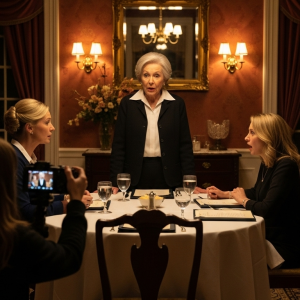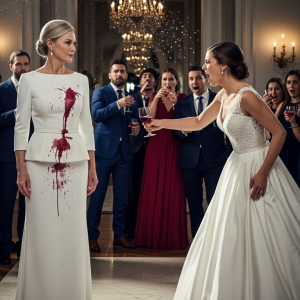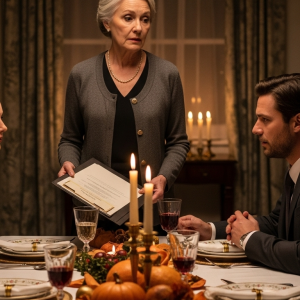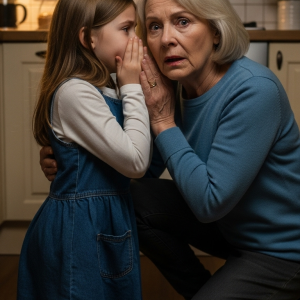The moment I saw my name tag at my son’s wedding reception, I knew exactly what Vanessa Sterling Williams thought of me. Dorothy Williams, The Charity Case. Her wealthy family erupted in laughter as I stared at those cruel words, written in her perfect calligraphy.
I smiled politely, placed the tag on my navy blue dress that suddenly felt shabby next to their designer gowns, and quietly excused myself to make one phone call. By morning, they would discover what real charity looks like.
Let me tell you how we got here. The story starts six months before that humiliating Saturday evening. My son, Michael, had fallen for Vanessa Sterling, a beautiful 29-year-old from Old Connecticut Money—the kind of money that builds wings on museums. When Michael first brought her home, I saw the disdain in her perfectly sculpted features as she surveyed my modest living room.
“How quaint,” she’d said, her voice dripping with false sweetness. “It’s so refreshing to see someone who isn’t obsessed with material things.” Even then, I bit my tongue. My boy was happy. But love, I’ve learned in my 68 years, makes fools of the wisest men.
The engagement party was my first real taste of what I was up against. Held at the Sterling family estate in Greenwich, it was a showcase of wealth that made my head spin. Crystal chandeliers hung from ceilings painted by artists whose names I recognized from museum placards.
Patricia Sterling, Vanessa’s mother, introduced me to her friends, her tone suggesting I was something unfortunate that had attached itself to her daughter’s happiness. “She’s from Ohio,” she’d announced, the way one might announce a rare but harmless fungus.
The wedding planning revealed just how deep their contempt ran. Every decision was made without me. When I offered to contribute to the rehearsal dinner, Patricia laughed out loud. “Oh, Dorothy, how sweet. But we simply couldn’t allow you to strain your limited resources. This is going to be quite expensive, you understand.”
Limited resources. If only she knew. But I kept playing the role of the struggling widow who cleaned houses to make ends meet. It wasn’t entirely false; I had done those things. Just not for the past three years, not since my dear Harold passed away and left me his “little” empire. The Sterlings didn’t need to know that. Not yet.
The wedding day dawned perfect and cloudless. The Sterling estate had been transformed into a fairy tale. I wore a simple but elegant navy dress from Nordstrom Rack, aiming to blend in, to be forgettable. Sometimes the best revenge begins with being underestimated.
The reception was where everything unraveled. I found my table, number 12, tucked away near the kitchen doors. Not with family; they were at table one, holding court like royalty. And that’s when I saw it. The name tag, written in Vanessa’s perfect calligraphy: Dorothy Williams, The Charity Case.
The breath caught in my throat. Not from hurt—I’d expected cruelty—but from the sheer audacity of it.
“Oh my goodness,” Patricia Sterling gasped, her hand flying to her throat in mock horror. “Vanessa, darling, surely this is some kind of mistake.”
But Vanessa’s smile was razor-sharp. “No mistake at all. I thought honesty was important in family relationships.” Her eyes met mine. “Don’t you agree, Dorothy? After all, we wouldn’t want anyone to get ideas above their station.”
The laughter started with Richard Sterling, her father, a booming sound that encouraged others to join in. I stood up slowly, placed the name tag carefully on my purse, and smiled. “You’re absolutely right, Vanessa. Honesty is very important. I think it’s time for some honesty all around.”
Then I walked away.
I found a quiet corner in the Sterling family’s library, surrounded by leather-bound books that probably cost more than my car. The irony was not lost on me. My fingers didn’t shake as I dialed. I’ve never been one for dramatics, just cold, calculated action.
“Robert, it’s Dorothy. I know it’s Saturday evening, but I need you to execute the Sterling portfolio adjustments we discussed. All of them. Tonight.”
Robert Hayes has been my attorney for fifteen years, one of the few people who knows exactly what Harold’s empire is worth. I could hear the concern in his voice. “Dorothy, are you certain? Once we pull those investments, the ripple effects will be significant.”
“I’m very certain. And Robert, activate the accelerated payment clauses on the Sterling Holdings loans. All of them.”
There was a long pause. “That will trigger immediate default proceedings. Richard Sterling won’t have 72 hours to respond.”
“Forty-eight hours should be sufficient,” I said, watching the wedding guests mingle on the terrace. “After all, we wouldn’t want to be unreasonable.”
“And if they try to negotiate?”
I thought about the name tag, about the laughter, about the years of quiet planning. “Tell them ‘The Charity Case’ sends her regards.”
After ending the call, I slipped back to the reception long enough to kiss Michael goodbye. Vanessa was radiant in her triumph. She had no idea she’d just triggered her own financial apocalypse. “Leaving so early?” she asked as I approached. “But we haven’t even cut the cake.”
“I’m sure you’ll manage without me,” I replied sweetly. “After all, you’re so good at making do with less.”
The next morning, I sat on my small apartment balcony with my coffee and waited. Harold had taught me that money whispers. The real power lies in knowing which whispers to listen to. When he died, everyone expected me to sell his investment company. They didn’t expect me to step into his shoes and discover I had a natural talent for seeing the weak spots in other people’s financial armor.
The Sterling family was particularly easy to research. Their “old money” was more reputation than reality. The family business, Sterling Holdings, survived on leveraged investments and carefully managed debt. Remove the right pieces from their financial Jenga tower, and the whole structure would collapse.
What made it delicious was how easy they’d made it. Richard Sterling worked for Meridian Financial, a company in my portfolio. He had no idea the little old lady his daughter mocked actually controlled his paycheck. Patricia Sterling’s charity boards all depended on grants from the Williams Foundation—Harold’s final gift to me, disguised under a common name.
My phone buzzed at 8:17 AM. It was Michael. “Mom, Vanessa’s crying about some kind of financial emergency. Her dad got calls from lawyers this morning. Do you know anything about this?”
I sipped my coffee. “How would I know anything about their financial affairs, sweetheart? I’m just the charity case, remember?”
“Mom, please! She’s saying her family might lose everything.”
“Are they?” I asked gently. “Or do they just spend like they are? Sometimes, Michael, what appears to be wealth is actually just very expensive debt. And sometimes, the people you think are powerless turn out to be holding all the cards.”
There was a long silence. “Mom… what did you do?”
I smiled, thinking about Vanessa’s name tag, tucked safely in my purse. “I made a phone call.”
By noon, my quiet apartment had become a command center. Robert called with hourly updates. “Meridian Financial is reviewing Richard Sterling’s position,” he reported. “And the house—foreclosure proceedings begin Tuesday unless they can produce $2.3 million by tomorrow. Unlikely, given their current liquidity crisis.”
All I had done was call in the loans they’d used to fund the wedding, all at once. Like pulling multiple foundation blocks from a house of cards.
Tuesday evening brought an unexpected visitor. Richard Sterling stood in my doorway, disheveled and unshaven, a man who’d aged a decade in three days. “Mrs. Williams,” he said, his voice hoarse. “I know what you did.”
“Do you?” I sat across from him, genuinely curious.
“You orchestrated everything. The loan defaults, the investment withdrawals. Someone with serious financial power decided to destroy my family, and the timing suggests it was you.” I had to admire his directness.
“That’s quite an accusation, Richard. What makes you think someone like me would have that kind of power?”
“Because I spent all night going through the corporate structures,” he said, his voice trembling. “Shell companies, investment trusts… all leading back to one source: The Williams Foundation. Harold Williams’s foundation.” The silence stretched between us. He had finally done his homework.
“Harold Williams,” I said slowly, “was my husband.”
Richard’s face went white. “You’re… Dorothy Williams? The Dorothy Williams? Harold’s widow, who inherited everything?”
“Yes,” I said, setting down my cup. “Including a controlling interest in the parent company that owns Sterling Holdings. Including the investment firm that handles your family’s portfolio. Including, as of last year, sixty percent ownership of Meridian Financial itself.”
The coffee cup slipped from his hands, shattering on my floor.
“You’ve been playing us from the beginning,” he whispered.
“Playing you? No, Richard. I’ve been watching you. Testing you. Seeing what kind of people my son was marrying into.” I knelt to clean up the broken ceramic. “Do you know what I discovered? I discovered that your daughter wrote ‘charity case’ on my name tag at her own wedding. That your wife introduced me as something embarrassing to tolerate. That your entire family found it amusing to mock a woman they believed was powerless.”
I stood, disposing of the broken pieces. “But most interesting of all, I discovered that none of you ever asked who I really was. You saw what you expected to see and never looked deeper.”
“What do you want from us?”
For the first time, I smiled. “I want you to understand what charity really means, Richard. Your daughter has until tomorrow to accept my terms. I suggest you encourage her to choose wisely.”
The next afternoon, Vanessa arrived at my apartment with Michael. She looked like a ghost of her former self.
“Mom,” Michael began, “Vanessa told me about your conditions. This is crazy. You can’t seriously expect her to work as a cleaning lady.”
“Why not? It’s honest work,” I said. “I did it myself for two years after your father died, before I fully understood what he’d left me.”
Vanessa looked up, her voice a whisper. “You really cleaned houses?”
“Every day. It was humbling work. It taught me that how you treat people you think are beneath you reveals everything about who you really are.” I looked directly at her. “I’ve been cleaning up other people’s messes my whole life. The only difference now is that I have the power to choose whose messes I’m willing to clean.”
“I accept your conditions,” Vanessa said, her voice barely audible.
Michael started to protest, but she held up her hand. “No, Michael. She’s right. I’ve been terrible to your mother. If working as a cleaning lady and volunteering at a homeless shelter is what it takes, then that’s what I’ll do.”
“This isn’t a punishment, Vanessa,” I said. “It’s an education. You’re going to learn skills money can’t buy: empathy, humility, the satisfaction of honest work.”
“And you’ll really help my family if I do this?”
“I’ll do more than help. I’ll restore everything.” I walked to my desk and pulled out a folder. “Because I own the companies involved. All of them. Harold built an empire, and when he died, he left it to me.” I spread the documents across the coffee table—corporate ownership papers, bank statements showing billions in assets.
Vanessa stared at the papers. “You could have stopped all this at any time.”
“Of course. But then, how would you have learned what really matters? This was all a test. The most important test you’ll ever take. And you failed it spectacularly when you wrote ‘charity case’ on my name tag.”
Six months later, I stood in the lobby of Meridian Financial, watching Vanessa scrub the marble floors. Her once-perfect manicure was gone, her hands rough from honest work. She wore the blue uniform of Sunshine Cleaning Service with something I’d never seen from her before: pride.
“Mrs. Williams,” she said, looking up. “I didn’t expect to see you here.”
“I had a board meeting. I thought I’d check on how you’re adjusting.”
She sat back on her heels, wiping sweat from her brow. “It’s hard work, but I’m learning. Did you know I’m actually good with my hands? Mrs. Patterson says I have a natural talent for detail work.”
“How are things at the homeless shelter?” I asked.
Her face lit up. “Amazing. There’s a little girl, Maria. She’s teaching me Spanish, and I’m helping her with homework. I never realized how much I could learn from people I used to think were beneath me.”
Over the past six months, I had watched her transform. The shallow socialite was gone, replaced by someone who understood the dignity of service.
“You passed the real test, Vanessa,” I told her. “Not the one where you failed to show respect, but the one where you chose to change. Character isn’t about never falling. It’s about getting back up and becoming better.”
I handed her an envelope. “Your father’s promotion was announced this morning. Senior Vice President. And your parents’ house is being transferred into a family trust. Consider it my wedding gift.”
Tears streamed down her face, cutting tracks through the dust on her cheeks. “Why are you doing this, after how I treated you?”
“Because I needed to know you were worth saving,” I said. “And you needed to discover who you could become when everything was stripped away.”
As I walked toward the elevator, she called after me. “Dorothy! Will you come to dinner on Sunday? I’m cooking for the first time. It probably won’t be very good, but…”
I turned back, smiling. “I’d be honored. After all, we’re family now. Real family.”
The elevator doors closed, but through the glass, I could see Vanessa returning to her work with renewed purpose. She’d learned the lesson I intended to teach her. True wealth isn’t measured in dollars, but in the lives you touch and the character you build. The charity case, it turned out, was the one offering true charity all along.




